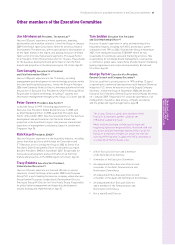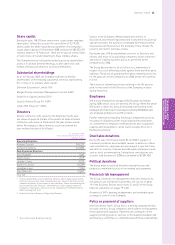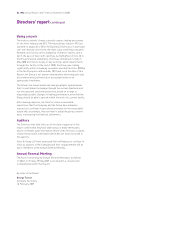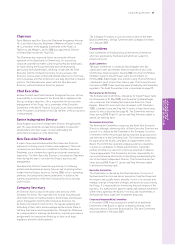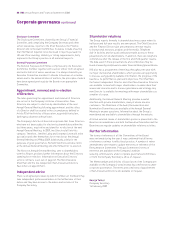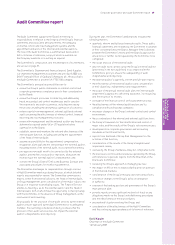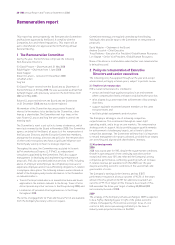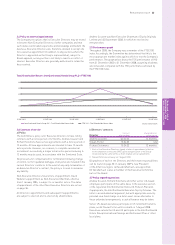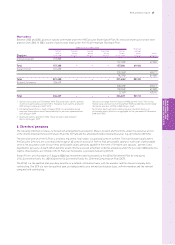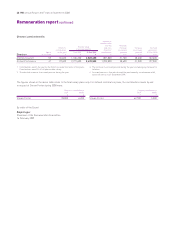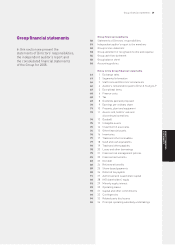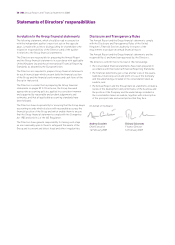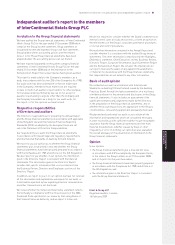Holiday Inn 2008 Annual Report Download - page 43
Download and view the complete annual report
Please find page 43 of the 2008 Holiday Inn annual report below. You can navigate through the pages in the report by either clicking on the pages listed below, or by using the keyword search tool below to find specific information within the annual report.
THE BOARD, SENIOR
MANAGEMENT AND
THEIR RESPONSIBILITIES
Remuneration report 41
The Committee believes that the current remuneration framework
continues to provide an appropriate link between reward and
competitive performance. However, the Committee has made
some adjustments in 2009, to ensure that the strategy of
competitive outperformance is sustained in the much more
challenging market conditions.
Base salaries and fees for Executive and Non-Executive Directors
have been frozen at 2008 levels. This decision has been taken in
view of the challenging cost environment within which the entire
Company will be operating throughout the coming year.
In the tough trading conditions anticipated in 2009, achieving the
Company’s earnings targets will be a key priority. Consequently, the
weighting placed on EBIT has been increased in the 2009 Annual
Bonus Plan (ABP). In addition, all senior executives will have
specific cost-savings targets in their key performance objectives.
Performance targets in the Long Term Incentive Plan (LTIP) for
2009/2011 have been set at stretching levels in the context of the
business plan, market expectations, and competitive performance
at the time the awards are made. The Committee believes that the
current measures of Total Shareholder Return (TSR) and Earnings
Per Share (EPS) will provide a transparent way for shareholders
to assess IHG’s competitive performance in the turbulent
environment being experienced.
In light of the significant market slowdown expected during this
three-year cycle, the EPS growth scale for the 2009/2011 LTIP has
been reduced. The lower, threshold performance requirement is
ahead of current market forecasts of IHG’s EPS growth over the
next LTIP cycle, and stretching in the context of market expectations
of industry-wide RevPAR decline. Despite the stretching nature of
this revised range, the Committee has decided that, due to the
reduced EPS scale, the maximum award level for the EPS portion
of the LTIP will be reduced by half.
Vesting will occur on a straight-line basis within the threshold
range of 0-10% per annum growth, with no award at the lower
threshold (compared to 20% of salary paid for achievement of
threshold previously). Thus, meaningful levels of vesting for this
element can only be achieved through EPS performance that is
significantly higher than market forecasts. No change has been
made to the TSR element of the LTIP scheme.
The Committee believes this 2009 remuneration structure will
focus management activity on making further competitive gains,
however challenging the market conditions.
2.3 Remuneration structure
IHG’s remuneration scheme for senior executives places a strong
emphasis on performance-related reward. The individual elements
are designed to provide the appropriate balance between fixed
remuneration and variable ‘risk’ reward, linked to both the
performance of the Group and the achievements of the individual.
Group performance-related measures are chosen carefully to
ensure a strong link between reward and underlying financial
performance, and emphasis is placed on achievement of key
strategic priorities.
The normal policy for all Executive Directors is that, using ‘target’
or ‘expected value’ calculations, their performance-related
incentives will equate to approximately 70% of total annual
remuneration (excluding pensions and benefits).
A summary of the fixed and variable elements of executive
remuneration is shown below:
The main components of remuneration are as follows:
Base salary and benefits
The salary for each Executive Director is reviewed annually and
is based on both individual performance and on the relevant
competitive market data. Internal relativities and salary levels in
the wider employment market are also taken into account. Base
salary is the only element of remuneration which is pensionable.
In addition, benefits are provided to Executive Directors in
accordance with local market practice.
In assessing levels of pay and benefits, IHG analyses those offered
by different groups of comparator companies. These groups are
chosen having regard to participants’:
• size – turnover, profits and the number of people employed;
• diversity and complexity of businesses;
• geographical spread of businesses; and
• relevance to the hotel industry.
Executive Directors’ salaries for 2009 remain unchanged
as shown below:
2009 Salary 2008 Salary
Andrew Cosslett £802,000 £802,000
Richard Solomons £510,000 £510,000
Annual Bonus Plan
Awards under the ABP require the achievement of challenging
performance goals before target bonus is payable.
The maximum bonus a participant can receive in any one year is
200% of salary. Achievement of target performance results in a
bonus of 115% of salary. Half of any bonus earned is deferred in the
form of shares for three years. No matching shares are awarded by
the Company. These arrangements were described in last year’s
Annual Report and Financial Statements and were introduced in
2008. The first cash and share awards will be made under these
arrangements in 2009, in respect of the 2008 financial year.
Fixed (approx 30%)
Key
TSR = Total Shareholder Return
EPS = Earnings Per Share
Base salary
Variable (approx 70%)
Long-term
incentive
Long Term
Incentive Plan
(Performance Shares)
Linked to individual
performance, financial
and operational
measures
Linked to relative
TSR and
adjusted EPS
growth
Annual Bonus Plan
(Cash and
Deferred Shares)
Short-term
incentive


